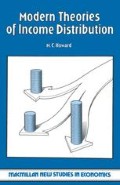Abstract
In the previous chapters we have examined the principal theoretical approaches to distributional problems which have been developed and used extensively in the post 1945 period. Attention has been focused on neoclassical theory and especially on its general-equilibrium formulation. It has already been pointed out that this theory is weak as an empirically relevant theory. Attention has been concentrated on certain types of equilibria, while at the same time the theory has indicated why such states are of limited interest. The assumptions regarding the choice-making abilities and knowledge of agents have been seen to be unreasonable, especially in an intertemporal setting which is most relevant for distributional matters. Actual futures markets, whether contingent or not, are very limited. Indeed, the context of perfectly competitive markets of any kind seem increasingly inappropriate for understanding the operation of advanced capitalist economies. The theory also ignores many of those economic phenomena like unemployment and inflation which are probably crucial to understanding distributional matters, at least over short periods of time.
Preview
Unable to display preview. Download preview PDF.
Author information
Authors and Affiliations
Copyright information
© 1979 M. C. Howard
About this chapter
Cite this chapter
Howard, M.C. (1979). Conclusion. In: Modern Theories of Income Distribution. Macmillan New Studies in Economics. Palgrave, London. https://doi.org/10.1007/978-1-349-16194-2_7
Download citation
DOI: https://doi.org/10.1007/978-1-349-16194-2_7
Publisher Name: Palgrave, London
Print ISBN: 978-0-333-19460-7
Online ISBN: 978-1-349-16194-2
eBook Packages: Palgrave Economics & Finance CollectionEconomics and Finance (R0)

